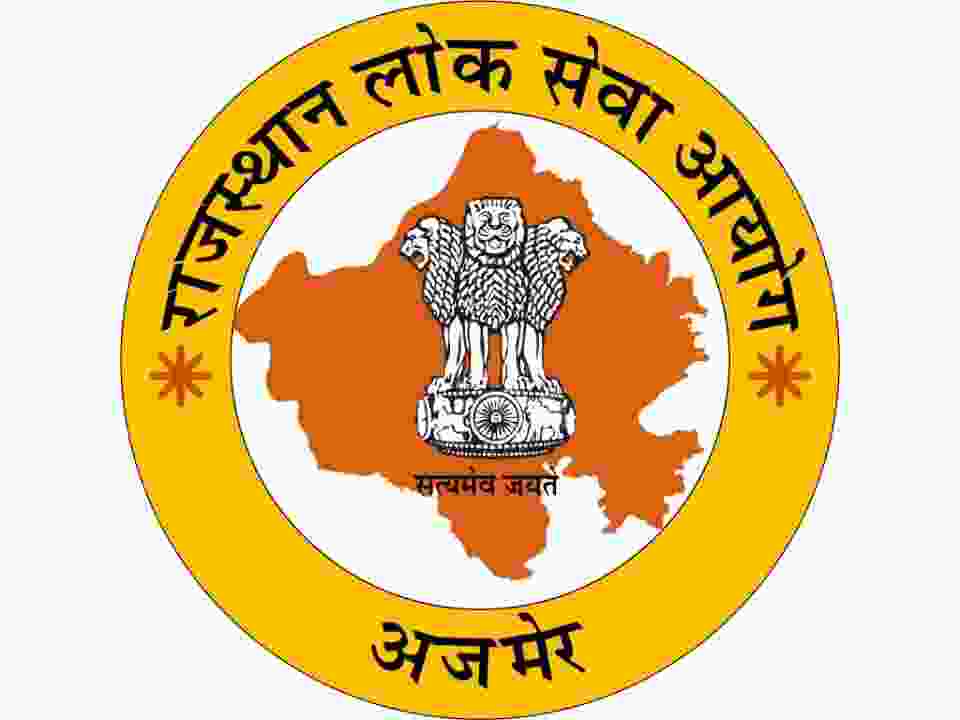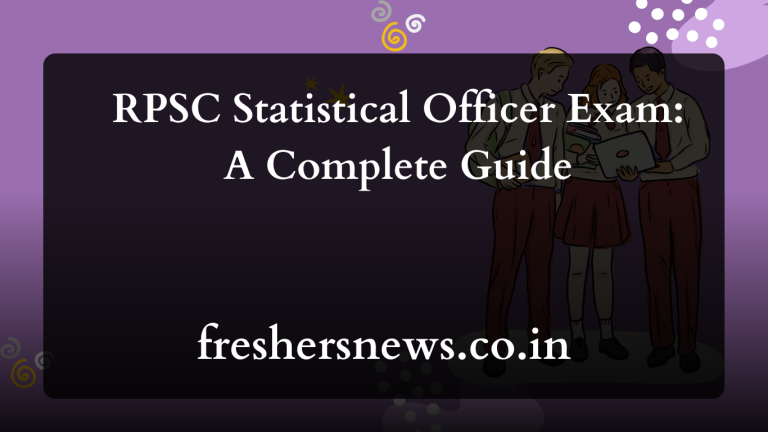Have you set your dream to serve Rajasthan? If so, you must plan to qualify for the Rajasthan Public Service Commission (RPSC) Statistical Officer exam, which will be the gateway to your dream career. This entire blog will equip you with all the essential information you need to navigate the RPSC exam confidently. Let’s dive into the RPSC Statistical Officer Exam: A Complete Guide.

Let’s dive into the RPSC Statistical Officer Exam: A Complete Guide:
Eligibility Criteria
- Educational Qualification: A Master’s degree in Statistics, Economics, Mathematics, or any other relevant subject from a recognized university.
- Age Limit: According to the latest notification, the age limit for appearing in the exam is usually between 21 and 40.
- Domicile: Candidates must be either domiciled in Rajasthan or belong to other categories mentioned in the official notification.
Exam Pattern
- Written Exam: This computer-based test (CBT) consists of objective-type questions. The exam usually covers various sections, including:
- General Knowledge (GK)
- General Hindi
- Statistics
- Economics
- Mathematics
- Reasoning Ability
- Interview: Candidates shortlisted from the written exam are interviewed to assess their suitability for the role.
Important Dates
- Notification release: September 15, 2023;
- Application window: September 15–October 14, 2023
- Correction window until October 24, 2023
- Admit card download: February 21, 2024;
- Written exam: February 25, 2024.
How to prepare for the RPSC Statistical Officer Exam
Understand the syllabus and examination pattern.
It is essential to have a clear concept regarding “what to study.” & “How it will be asked?”
Create a study plan.
Once you have the perfect materials, you must create a study plan. This will assist you in remaining on track and covering all of the crucial topics. Your study layout has to be realistic and achievable, and you must plan practical time for every analysis of a new topic and revise what you have already learned.
Self-Study or Coaching
Students’ most common questions are how to prepare for the RPSC exam and whether to take coaching. The best decision will be a combination of both. Now, RPSC is not included in your school curriculum. Therefore, coaching will guide your preparation by providing relevant study materials and tests. Then, you can solve exercises and review materials to study independently.
Work on fundamentals
Developing fundamental concepts should be prioritized before moving on to RPSC exam-level questions. So, focus on studying basic concepts and practice easy questions first. Then, gradually move on to higher-level questions.
Practice lots of questions.
After completing a topic, practice asking as many questions as possible. Move from lower to higher-difficulty questions. Reviewing the concepts a few times through practice can help you prepare for the RPSC exam.
Analysis of test
A practice test is a simulation of the actual test. As the exam approaches, taking practice tests regularly should be part of your RPSC preparation strategy. Additionally, it is equally important to analyze your simulations and identify your weaknesses.
Practice regularly
One of the best approaches to put together for the RPSC examination is to practice answering questions regularly. You can do this by solving exercise papers and taking mock tests. Many unique exercise papers and mock tests are available online and in books.
Stay motivated.
It is essential to be stable, active, and motivated throughout your preparation.
Focus on your weak areas.
As you start answering questions, you will perceive your weak areas. Once you know your weak areas, you can focus your research on these topics. You will additionally need to get additional exercise material for these topics.
Stay up-to-date on current affairs.
The RPSC examination also asks for current affairs. Therefore, it is essential to be updated on modern events. You can use newspapers, observe information channels, and follow information websites and social media pages to be updated.
About the Syllabus of the RPSC Statistical Officer Exam
Statistical Methods
- Descriptive Statistics include measures of central tendency (mean, median, mode), dispersion (range, variance, standard deviation), skewness, kurtosis, frequency distribution, data collection, and presentation methods.
- Probability and Probability Distribution: This section covers the basic concepts of probability, conditional probability, Bayes’ theorem, random variables, probability distributions (binomial, Poisson, standard), and sampling techniques (simple random sampling, stratified sampling, cluster sampling, etc.).
- Statistical Inference: Point estimation, confidence intervals, hypothesis testing (t-test, ANOVA, chi-square test), regression analysis.
Economics
- Microeconomics includes consumer behavior, the theory of demand and supply, market equilibrium, production theory, cost and revenue analysis, market structures (perfect competition, monopoly, etc.), national income and its measurement methods (GDP, GNP), inflation, unemployment, fiscal policy, and monetary policy.
Mathematics
- Algebra: set theory, functions, matrices, determinants, inequalities, quadratic equations, permutations, and combinations.
- Calculus: differentiation, integration, applications of derivatives and integrals.
Reasoning Ability
- Verbal reasoning, analytical reasoning, logical reasoning, critical thinking, and problem-solving.
General Knowledge (GK)
- Current affairs (national and international)
- General knowledge of India and Rajasthan (history, geography, polity, economy, culture)
- Science and technology awareness
Which books do you prefer for the RPSC STATISTICAL OFFICER exam
Statistics
- Fundamentals of Statistics (Hindi Edition) by S.C. Gupta and V.K. Kapoor
- A Modern Introduction to Probability and Statistics by F. Rolf Hallenborg
Economics
- Indian Economy by Ramesh Singh
- Principles of Microeconomics by N. Gregory Mankiw
- Quantitative Aptitude for Competitive Examinations by R.S. Aggarwal book
- Fast Track Objective Arithmetic by Rajesh Verma
Reasoning Ability
- Analytical Reasoning by M.K. Pandey
- A Modern Approach to Logical Reasoning by R.S. Aggarwal
General Knowledge (GK)
- Lucent’s General Knowledge by Lucent Publications
- Manorama Yearbook
Common mistakes to avoid in the RPSC Statistical Officer Exam
- Not analyzing the examination pattern, questions, and syllabus: It is essential to have a clear concept of the study program and which topics to focus on.
- Not managing time effectively: Time management is essential in any competitive exam.
- Not practicing regularly: One excellent method for preparing for the RPSC examination is to practice answering questions regularly.
- Making common mistakes: Concentrating and avoiding careless mistakes in competitive exams is crucial.
- Do not focus on weak areas: As you practice answering questions, you will become aware of your weak areas.
FAQs
Mention if there are any reservations/ special provisions for specific categories of candidates in the RPSC selection process.
Yes, the Government of India offers reservations for eligible candidates belonging to:-
- Scheduled Castes (SCs),
- Scheduled Tribes (STs),
- Other Backward Classes (OBCs),
- Persons with Disabilities (PwDs).
What is the selection procedure after the written exam?
After the written exam, shortlisted candidates are referred to an interview. The interview typically assesses your personality, conversation skills, subject-specific knowledge, and grasp of current issues. The weightage of the written examination and interview may additionally fluctuate depending on the particular notification for every examination year.
How do you crack the RPSC Statistical Officer without admitting to a coaching institute?
- Self-study with structured resources.
- Form study groups or online communities.
- Seek individual mentorship.
- Focus on self-awareness and learning styles.
How do I manage time effectively during my preparation?
- Create a realistic study schedule.
- Utilize your commute or breaks for revision.
- Optimize your study sessions.
- Delegate and prioritize.
- Maintain a healthy lifestyle.
What are the professional possibilities after clearing the RPSC Statistical Officer Exam?
Successful candidates are appointed as statistical officers in various government departments in Rajasthan. They play a critical role in collecting, analyzing, and interpreting data, imperative in informative decision-making across several sectors. They can also pursue fabulous experiences and be promoted to senior positions or specialized roles inside the authorities.
Conclusion
In conclusion, the RPSC Statistical Officer Exam is a gateway to a profitable profession in the government sector. You can significantly increase your chances of success by thoroughly understanding the examination pattern, syllabus, and essential dates and adopting a strategic and devoted preparation strategy. Remember, steady effort, the proper resources, and a positive mindset are key factors in your journey toward excelling in this exam. We hope this complete blog has equipped you with treasured insights and a guide to help you achieve your goals.



